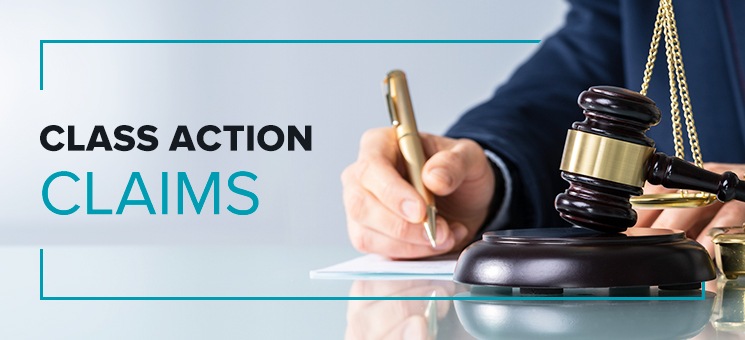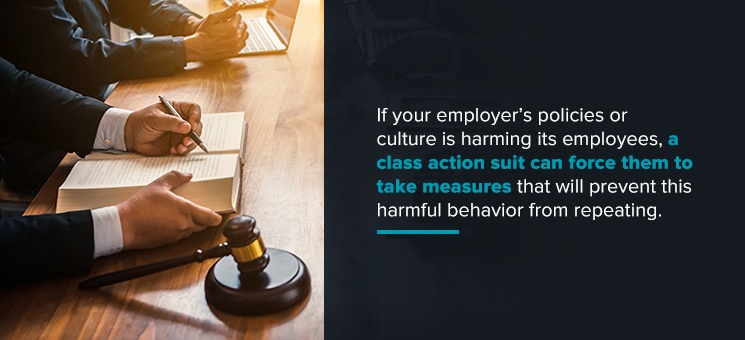Class action lawsuits are typically filed in cases of large-scale, systemic neglect against a group of people. This can include a company knowingly releasing a defective or dangerous product, financial institutions using predatory lending policies and civil rights cases. In certain circumstances, a class action suit can be an effective way of forcing change on an employer engaging in abusive or discriminatory practices at either the formal or informal level.
If you’re considering filing any kind of legal action against your employer, speak with the team at Weisberg Cummings, P.C. first. Our class action lawyers will review your case and advise on whether or not a multi-plaintiff suit is the best way to proceed.
What Is a Class Action Suit?
A class action lawsuit refers to a case in which a company or organization has harmed many people in a similar way. The following are some well-known class action suits:
- Brown v. Board of Education
- A lawsuit in which women received a silicone breast implant and then contracted an autoimmune disease
- A lawsuit in which customers of Wells Fargo claimed the bank forced them to purchase unnecessary car insurance
Class action lawsuits are often caused by dangerous or defective products, work-related issues, fraudulent information and fraudulent business practices. If you believe you may have a class action lawsuit, many other people must have been harmed in a similar way by the company you are filing the lawsuit against.
Why File a Class Action Lawsuit?
What makes a class action lawsuit a good choice over a traditional lawsuit? There are a number of benefits to filing a class action suit as opposed to an individual, or single-plaintiff, action:
- Less expensive: Class action suits are less expensive to pursue, as legal costs are often shared between a number of parties. This can be particularly helpful in cases where individual plaintiffs may have relatively small damages, but when combined with others, the damages may be very high, making the litigation more economical.
- Power in numbers: Additionally, there is power in numbers — the testimony of others who have had a similar experience may go a long way towards tilting the case in your favor.
- More incentive to settle: Class action lawsuits also give the defendant more incentive to settle, as they will be taking care of the matter quickly without the potential for ongoing legal action as more plaintiffs step forward.
- Effect change: Perhaps most importantly, class action employment lawsuits have a much better chance of effecting positive change at the organizational level.
If your employer’s policies or culture is harming its employees, a class action suit can force them to take measures that will prevent this harmful behavior from repeating. Often, when a class action employment lawsuit receives a lot of media exposure, it can be a catalyst for improved industry-wide working conditions or for legislative action at the state or federal level. This means when you file a class action lawsuit, you can potentially spur change on a large scale.
Requirements for Filing a Class Action Lawsuit
Typically, anyone is able to begin a class action lawsuit, but certain requirements must be met. Your attorney will ensure your claim meets the requirements to file a class action lawsuit. A judge, however, is the one who will decide whether your case can proceed. The judge’s considerations will include the following:
- Whether the members share the same legal and factual issues: For a class action lawsuit, legal and factual issues should be common to every class member. Additionally, all class members should suffer the same type of injury.
- The number of people who have been affected: In a class action lawsuit, the company being sued must have harmed a large number of people. If a small number of people have been harmed, the judge may decide they should file individual lawsuits instead of a class action suit. Typically, several dozen people should be injured for a class action suit.
- Whether the potential class is represented adequately: The interests of each of the class members should be adequately represented. The attorneys who represent the class should have experience in handling complex litigation and class action lawsuits.
- Whether the plaintiff’s legal claims are typical of all members: The lead plaintiff should have injuries and claims that are common to all the potential members of the lawsuit. To satisfy this requirement, the plaintiff should serve the interests of the other class members when they advance their own interests.
If your case meets these requirements, you may be able to proceed with a class action lawsuit. Class action lawsuit lawyers can help you determine what other information you may need to know before beginning a class action lawsuit. Your attorney will determine what the defendant’s resources are, whether the potential reward justifies a class action lawsuit and whether you should be the lead plaintiff in the class action lawsuit.
When to File a Class Action Lawsuit
Class action employment suits are typically brought in cases where office culture encourages widespread sexual harassment, where equal pay or other labor laws are routinely violated or where employers engage in ongoing discrimination on the basis or race, age, sex, religion or disability status. Multi-plaintiff lawsuits can also be brought when employees are not properly paid overtime or are not paid for all of their work. To discuss the specifics of your case, contact Weisberg Cummings, P.C. and arrange your free consultation today.
How to Start a Class Action Lawsuit
Do you believe you may have a class action case? If so, you should know how to go about starting a class action lawsuit. The following is a step-by-step process for filing a class action suit:
- Determine whether you can file a class action lawsuit: Your first step is speaking with a class action attorney. A class action lawsuit can be quite complicated, and your lawyer will help you decide if you have a basis for a lawsuit.
- File a class action lawsuit: Your attorney will draft a complaint if they believe you can file a class action lawsuit. This legal document describes the damages that are being sought, the facts of your case and the individuals who may potentially be covered in the lawsuit.
- Certify the class: The judge presiding over your case will rule whether the lawsuit is given class action status in a process known as class certification.
- Investigation: The investigatory phase is known as discovery. During this step, your attorney may contact the company being sued for documents that can prove the lawsuit’s allegations. Individuals who have knowledge of the circumstances and events of the lawsuit may also be contacted for depositions.
- Resolve your claim through a settlement or trial: Many class action cases are settled before they go to trial. The defendant may set up a settlement fund to compensate the victims. A settlement is final when an order approving the settlement is issued by the judge.
- Notify class members: Finally, attorneys will inform other class members about the judgment or settlement. This notice will include the class member’s right to opt-out of the class action case and a description of the underlying facts in the lawsuit.
Who to Contact for a Class Action Lawsuit
If you already have an attorney, contact them to discuss representation for a class action lawsuit. If your attorney is not interested in representing you, they may refer you to a class action law firm that specializes in class action lawsuits. Or you may want to reach out to the experienced class action attorneys at Weisberg Cummings, P.C.
During a consultation, you may be asked about the details of your potential class action case. An attorney may also request supporting documentation if they believe a class action lawsuit can be filed. For example, you may be asked for documents or photos that prove damages occurred.
Courts often dismiss frivolous lawsuits, so an attorney will want to ensure you have a valid claim before proceeding. The attorney may also research similar cases and their outcomes, find out the number of other people who may have been similarly harmed and determine if any laws have been broken.
Schedule a Free Consultation With Weisberg Cummings, P.C.
The class action lawyers at Weisberg Cummings, P.C. have more than 40 years of combined experience arguing employment law cases both at the negotiating table and in the courtroom. Serving clients throughout Pennsylvania, our team can provide effective, aggressive representation in all types of employment-related issues. We are locally focused and committed to protecting the rights and livelihoods of our friends and neighbors.
If a class action suit is the best way to proceed, we will determine the steps necessary to move forward, including gathering evidence, identifying co-defendants and filing the necessary motions against the defendant. Contact us at our office today to find out what we can do for you or to schedule a free consultation.



